In-mold labeling provides a fabulous fix for home repair product pails
January 29, 2014
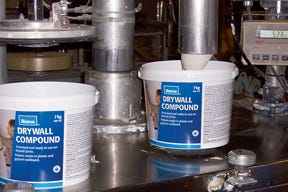
Home Hardware fills its redesigned, 1-gal pails of drywall compound and stucco at its plant in Burford, ON. Replacing its dry-offset-printed pails with containers decorated with IML has greatly enhanced the appearance of the company's home improvement products.
Home Hardware is no stranger to renovation. Comprising more than 1,000 independently owned member stores in Canada, the St. Jacobs, ON-based home improvement products, construction materials and home furnishings retailer offers its customers more than 100,000 items for the repair and maintenance of their homes, lawns and gardens, farms, and automobiles, among other products.
Last year, the company's Paint and Home Products Division, Burford, ON, did some overhauling of its own, refreshing the package decoration for its private-label products in 1-gal pails. The division produces more than $60 million in private-label products annually for Home Hardware stores across Canada and was eager to take advantage of its container suppliers' new decorating capabilities to enhance its products' presence on-shelf.
Allison's Gourmet Kitchen offers prepackaged salads and desserts in IPL Packaging's square, Shure-Lock(R) containers. Read more at www.packagingdigest.com/ info/allison
Last March, Home Hardware introduced the first 1-gal injection-molded pails decorated with in-mold labeling (IML) for home improvement products in Canada. Supplied by IPL Packaging (www.ipl-packaging.com), the IML pails provide greatly improved graphics that have been responsible, Home Hardware says, for a 27-percent increase in sales of its stucco brand alone.
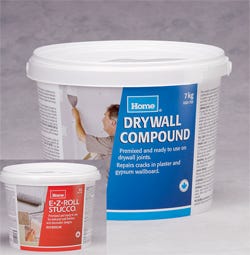
One of the fastest-growing decorative processes for plastic packaging, IML offers visibility and graphics not achievable with processes such as dry-offset or screen printing. As Jacques Carten, marketing manager for IPL, observes, for the last 25 years, IML has been a popular labeling solution in Europe, but has just started to make significant headway in North America, particularly in the home repair and food industries.
IML is a process in which a film label is added to a plastic container during the blow-molding or injection-molding operation, so that it becomes part of the container. In contrast to other decorating techniques, such as dry-offset printing, and other labeling methods, such as shrink-sleeve or pressure-sensitive labeling, IML eliminates the need for additional printing or labeling equipment, and it condenses a two-step process—molding and labeling—into one, single operation.
During the IML/injection-molding process, a printed film label is placed into an open mold using robotic pick-and-place equipment and is held in the desired position by vacuum ports, electrostatic attraction and other means. The mold then closes, and the molten plastic resin is injected into the mold where it envelops the label, making it an integral part of the container.
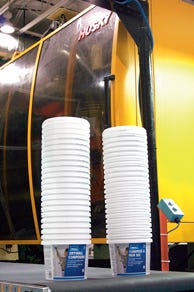
Home Hardware's 1-gal pails of drywall compound are decorated and molded in a one-step process at IPL's Saint-Damien, QC, facility. During the process, PP labels are placed into the mold of the injection-molding machine via pick-and-place robots. The plastic resin then envelopes the label, making it an integral part of the container during manufacturing.
For years, Home Hardware relied on dry-offset printing to decorate its 1-gal containers of E-Z Roll Stucco(TM) and Dry Wall Compound(TM). In late 2005, its container supplier, IPL, invested in the technology to provide IML for 1-, 1.3- and 4-gal containers and proposed that Home Hardware make the transition. Nancy Dingman, business manager of Specialty Products for Home Hardware, recalls that the co.'s decision to switch was facilitated by the fact that IPL was the first company to produce IML packaging for injection-molded containers in North America.
"Our representatives from IPL approached us and asked us if we wanted to be the 'guinea pigs' for IML packaging for this type of application," Dingman says. "Once we saw the photographic quality of the labels compared to the printing process we were currently using, there was absolutely no reason why we didn't want to move forward.
"With our dry-offset-printed pail, we were limited on our print area. There was a total of about an inch and a half on the top and bottom that was just white pail. The IML process lets us print every square inch of the front, top to bottom. Even though the pail is the same size as the old one, people perceive it as a bigger container. This gives us a better shelf presence and a stronger 'billboard effect.'"
Andy Scodras, a Home Hardware purchasing agent who oversees paint products and evaluates new packaging, says that his company's positive experience with IPL's IML packaging comes as no surprise, given the long-standing relationship between the two companies.
"IPL has been a supplier to the paint division for many years," Scodras says. "About a decade ago, IPL began supplying us with a twenty-liter plastic paint container. We were pleased with the product, the service and the value, so it wasn't long before we started talking with them about our nonpaint items.
"Given our satisfaction with IPL and the fact that we tend to give preference to an incumbent supplier to help realize economies of scale, it wasn't difficult to make the decision to use IPL containers on our stucco and drywall products."
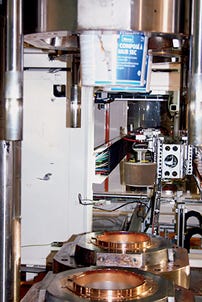
Molded pails await removal from the injection-molding machine.
A supplier to retail and industrial goods brand owners in Canada and the U.S., IPL is a family-owned business based in Saint-Damien, QC, that marketing manager Jacques Carten says has grown to its current $215 billion in sales through its constant innovation and plastics manufacturing expertise. The company was formed in 1939 as a manufacturer of straw brooms by Joseph Emile Métivier, whose sons Julien, Rémi and Clément now run the company. IPL's entrance into the plastics injection-molding market can be traced back to 1952, when it purchased its first press to produce toothbrush handles and cases.
Today, IPL manufactures both extruded and injection-molded plastic products that include food and industrial packaging containers, material handling and waste bins, and snowmobile and automotive components. The packaging division, Carten notes, accounts for 50 percent of the company's sales.
At IPL's main manufacturing facility in Saint-Damien, the company operates more than 60 injection-molding presses, most of which are supplied by Husky Injection Molding Systems Ltd. (www.husky.ca), to produce plastic containers ranging from 8 oz to 6.5 gal. Among some of the innovations that IPL lays claim are the use of 100-percent-recycled polypropylene for 1-gal and larger containers (rather than polyethylene) for its greater structural resistance; the introduction of square retail containers that provide a space savings as well as an enhanced billboard effect; and an easy-to-use, environmentally friendly tamper-evident break-tab feature for its lids.
According to Carten, IPL was also the first to invest in IML technology for injection-molded products in North America. In 1996, IPL, along with its proprietary robot supplier, engineered a robotic pick-and-place system for its injection-molding equipment that would enable IML decoration for containers from 8 to 32 oz.
As Carten explains, IPL faced two challenges in creating an injection-molding system to accommodate IML: the design of the molds and the speed of the robots.
"While the injection-molding presses are the same, the molds have to be designed in such a way that when you put a label into the molds, the resin will flow behind the label, because otherwise the label will just flow with the resin and will melt within the resin itself," he says. "The speed of the robot is also vital. While there are a lot of companies developing robots, we needed a system that could put the label into the mold and exit the press in approximately one-half second. Cycle time is very important to packaging manufacturers; we needed to have a maximal cycle time of not more than one-half second on the injection. More than that, and it would not be worth it."
Until it introduced IML on its larger-size pails, IPL's main customers for IML have been private-label prepared salads marketers, such as Kroger. Carten estimates that IPL now holds a 25-percent share of the prepared salads market in North America.
IPL now offers IML on 10 container sizes and four lids. Many of its containers are made from PP, which it says require 20-percent less resin than pails made from PE and exhibit "immense top-load strength." In addition, notes Carten, PP also withstands higher temperatures than PE, which is an advantage for hot-filling applications.
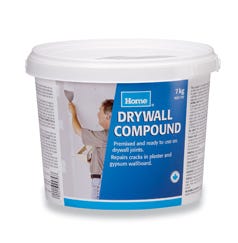
Complementing the pails, IML substrates are also made from PP and are supplied to IPL by a proprietary converter in thicknesses from 57 to 82 microns. Thicker labels are used for larger containers, making it easier for the robot to handle the substrate from label magazine to mold. Three types of labels are offered by IML—opaque with an "orange peel" finish, opaque with a glossy finish and transparent with a glossy finish—for various effects. Carten notes that a recent visit to Europe revealed that other emerging label options being used there include metallic and holographic styles.
Through IPL, labels are flexo-printed in four-color process in up to eight colors, providing a reproduction quality of 150 lpi. According to Carten, this is one of the tremendous advantages of IML over other container decorating processes for products in the do-it-yourself market. "On most of these types of products, there are illustrations on the labels of how to use the products. Many times, these graphics are difficult to understand when they are reproduced with offset printing," he says. "With IML, you can clearly reproduce a photograph of someone using the product at home, making it much easier for the consumer to visualize. That's another reason why brand owners are considering IML for their products."
With IML, labels can also be printed with type as small as 6 pt, without a loss of clarity—a benefit for products requiring extensive legal copy or descriptors. And, Carten relates, IML provides a greater consistency in background colors over offset-printed pails. An example he uses to emphasize the importance of color uniformity for brand recognition is a container that IPL produced for Elmer's Products, Inc. for its wood-filler mixture. Elmer's, he relates, is very protective of its PMS orange and blue colors, as well as its trademark cow logo, and through IML, IPL was able to produce the containers with consistent, solid colors and crisp graphics, much to Elmer's liking.
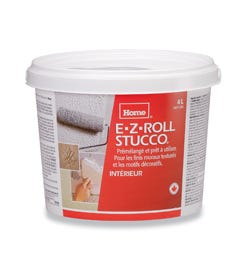
Home Hardware employs several different types of IPL pails: a handled, 5.5-gal pail for paint, cleaning products and driveway sealer, and 0.5- and 1-gal pails for drywall compound and stucco. While IPL does not currently offer an IML-type container for Home's paint products, Scodras has been able to enhance his packaging graphics nonetheless.
"Over the past year, we changed the label on some of our best-selling paints and the Acrylic Driveway sealer from paper to a dry-offset printing," he says. "It really enhances the label, especially since it can't be torn or damaged like the paper version. What's more, our production department prefers this new label since they no longer have the additional task of applying the labels before filling the pails."
As both Dingman and Scodras point out, it is not only the product or the price that have cemented Home Hardware's relationship with IPL, it is also the service. When it comes to service, IPL has redefined the term "above and beyond."
"When we changed from our existing pail to another for the in-mold label, there was a production issue," says Scodras. "On the new pail, there was a sharp bottom edge that caused some problems on our production equipment. To IPL's credit, they identified the problem and worked very hard with us to solve it.
"But they did more than just talk about it," he adds. "Within an hour of telling IPL that we had this problem, they had an expert come in from a machine shop to evaluate our production line and see what could be done. Ultimately, they added an extra piece to our equipment that would keep the containers from 'hopping up,' letting us slide the pail into the carton without buckling it. IPL not only put the piece on, they had it designed and built."
Assuming that IPL continues to perform well and the price points remain relatively steady, Dingman says that she would examine the option of rolling out additional IPL packages.
"As soon as IPL offers a smaller, two-liter size, we will be interested in switching," says Dingman. "Unfortunately, many of the products on the nonpaint side—general-purpose cleaners, handsoaps, fertilizer and aerosols—don't lend themselves to pail-type packaging. But as we introduce new products that are appropriate, we will definitely look to IPL first.
"It should be noted that there are a number of outside suppliers that make Home Hardware private-label products like grout and wood filler that also use IPL packaging. So we're not the only ones who recognize their value."
But certainly, no one places a higher premium on their value than Scodras and Dingman, who have seen their products not only appear to "grow" on the shelf with their enhanced graphics, but fly off of it as well.
More information is available:
IPL Packaging, 800/463-0270. www.ipl-packaging.com.
Husky Injection Molding Systems Ltd., 905/951-5000. www.husky.ca.
About the Author(s)
You May Also Like


